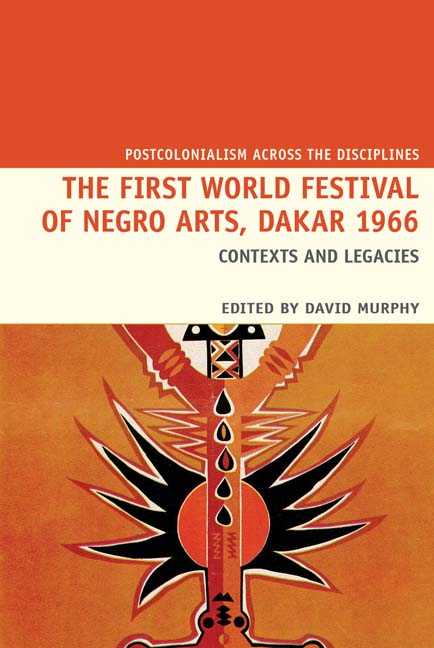Book contents
- Frontmatter
- Contents
- Acknowledgements
- List of Figures
- Notes on Contributors
- Introduction. The Performance of Pan-Africanism: Staging the African Renaissance at the First World Festival of Negro Arts
- I Contexts
- II Legacies
- 6 ‘Negritude is Dead’: Performing the African Revolution at the First Pan-African Cultural Festival (Algiers, 1969)
- 7 Beyond Negritude: Black Cultural Citizenship and the Arab Question in FESTAC ‘77
- 8 Cultural Festivals in Senegal: Archives of Tradition, Mediations of Modernity
- 9 FESMAN at 50: Pan-Africanism, Visual Modernism and the Archive of the Global Contemporary
- 10 PANAFEST: A Festival Complex Revisited
- Books and Films about the 1966 Festival
- Bibliography
- Index
7 - Beyond Negritude: Black Cultural Citizenship and the Arab Question in FESTAC ‘77
from II - Legacies
- Frontmatter
- Contents
- Acknowledgements
- List of Figures
- Notes on Contributors
- Introduction. The Performance of Pan-Africanism: Staging the African Renaissance at the First World Festival of Negro Arts
- I Contexts
- II Legacies
- 6 ‘Negritude is Dead’: Performing the African Revolution at the First Pan-African Cultural Festival (Algiers, 1969)
- 7 Beyond Negritude: Black Cultural Citizenship and the Arab Question in FESTAC ‘77
- 8 Cultural Festivals in Senegal: Archives of Tradition, Mediations of Modernity
- 9 FESMAN at 50: Pan-Africanism, Visual Modernism and the Archive of the Global Contemporary
- 10 PANAFEST: A Festival Complex Revisited
- Books and Films about the 1966 Festival
- Bibliography
- Index
Summary
At the core of the analytic apparatus on which black cultural citizenship gains its force is the reality that there are spaces of cultural production that are not dependent on the regulatory role of the state.
Kamari M. Clarke, ‘Notes on Cultural Citizenship in the Black Atlantic World’ (2013): 470When Nigeria hosted FESTAC ’77 to celebrate the cultural foundations of the ‘Black and African World’, it was fashioned after Senghor's Festival mondial des arts nègres (FESMAN '66) held in Dakar 11 years e arlier. Like its predecessor, FESTAC featured the dance, drama, music, arts and philosophical legacies of a ‘traditional’ Africa all of which were regimented by opening and closing ceremonies and exalted as a framework for black nationhood and development. And if FESTAC was planned on a far grander scale, funded by the windfalls of a rising petrostate, its kinship with FESMAN was further solidified between both heads of state, who would serve together as co-patrons of Nigeria's cultural extravaganza. What began as a diarchic alliance, however, soon devolved into a divisive debate over the meanings and horizons of black cultural citizenship. At issue were competing Afrocentric frameworks that clashed over the North African or ‘Arab’ question. Should North Africans fully participate, as Lieutenant-General Olusegun Obasanjo maintained, or should they merely observe as second-class citizens, as Léopold Sédar Senghor resolutely insisted? If Nigeria's expansive and inclusive vision of blackness was motivated and underwritten by its enormous oil wealth, Senghor refused to compromise his position, precipitating a face-off that ultimately lowered Senegal's prestige.
To understand why North Africa became the focus of these competing definitions of blackness, I turn to the 1969 Pan-African Cultural Festival in Algiers, where Negritude was disclaimed as counter-revolutionary. Placed within a genealogy of postcolonial Afrocentric festivals, the struggle over North Africa in FESTAC ’77 shows that the political stakes of black cultural citizenship were neither trivial nor ephemeral, but emerged within a transnational festival field of cultural spectacle, racial politics and symbolic capital accumulation. As we shall see, our focus on postcolonial festivals in Africa as primary objects of study ‘in themselves’ rather than as secondary reflections of ‘external’ realities de-centres the state as the locus of citizenship while foregrounding the performative and embodied conditions of its genesis.
- Type
- Chapter
- Information
- The First World Festival of Negro Arts, Dakar 1966Contexts and legacies, pp. 161 - 175Publisher: Liverpool University PressPrint publication year: 2016



